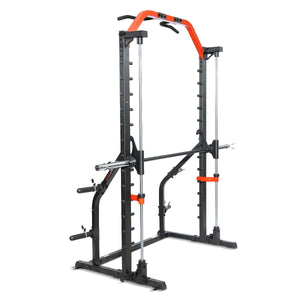Summer can be the best time, but also the hardest time to work out. If you struggle to stick to your fitness routine when all the summer parties, vacations, weddings, and events are distracting you, here are 5 tips for motivation to keep on your fitness routine.
1. Find Your Tribe
Join a group exercise class, a CrossFit gym, or a virtual community group on a digital platform.
A 2008 study (1) examining human motivation and self-determination shows that fostering social connections and support is associated with cultivating engagement and commitment to your goals. This study focused on motivation and well-being; researchers investigated the social environments that boosted motivation and discovered that people must be supported in basic psychological needs, feelings of competence, and relatedness to enhance fitness motivation. Working out with a group shows intrinsic and extrinsic motivational factors that are essential in staying motivated and committed to our fitness routines; it is also great for psychological health.
Invite a group of friends. Summertime is the best time to get everyone active. Working out with friends is fun and studies show that it is motivating. You are also doing your part in helping others with their own fitness goals, too. If you are a parent, and your kids are on summer break, get those kids off the devices and out into the summer sun! Walks and games outside can also help motivate you to stick to your fitness routine. Studies show that when mom and dad work out, their children are more likely to lead a healthier lifestyle (2).
The CrossFit workout methodology has experienced tremendous growth and popularity over the last 10+ years. This type of fitness design utilizes high-intensity workouts that incorporate various calisthenics and weightlifting movements and is typically delivered in a group format by a qualified instructor (3). In this study, researchers examined the relationships among goals, psychological needs, behavioral regulation, and participation frequency in over 300 athletes. They found that having intrinsic goals, such as developing skills or improving health, predicted greater psychological satisfaction. The researchers found that competence and autonomy produced high levels of intrinsic motivation and positively influenced participants to attend workouts consistently. You can maximize your motivation by focusing on skill learning and health when your feelings of competence and autonomy are met.
Network support using social networking services has been shown to help with exercise adherence (4); researchers found that individuals with the highest interaction on social forms geared towards exercise had the most heightened sense of community self-efficacy for exercise and social support. The research shows that interpersonal relationships and social interactions are shifting from in-person to online environments due to the development of the internet and smart devices. Social networking services help individuals interact and connect with others easily, regardless of time and place, including those with diverse racial and ethnic backgrounds. A study done in 2020 (4) showed that individuals quickly establish new interpersonal networks and experience psychological well-being that creates happiness and satisfaction with life. Social networks are also recognized as valuable and excellent platforms for delivering health interventions and bringing people together worldwide.
At Sunny Health and Fitness, we have got your back this summer (and all year round!). Use the Sunny health and Fitness social network on YouTube or the SunnyFit® App to find new workouts, great trainers, and connect to others. Sunny Health and Fitness can also help you stay on track with bodyweight classes you can do anywhere, even on your summer vacation.
2. Celebrate Yourself
In the summer the weather is better, daylight hours are longer, and the whole vibe feels happier, why not take a beach day after a workout to celebrate your win?
Celebrate your wins no matter how small. Whether you just started your fitness journey or completed your first or 100th workout, it is something worth recognizing! Have pride in that, and be proud of what you did. It is okay to celebrate yourself; these are hard steps for most of the population, but check yourself out. You're doing it. Time for a celebration- science says so.
Rewards and self-motivation are essential for staying motivated to resume your fitness journey. A study published in the journal Motivation and Emotion discovered that people who could self-motivate and reward themselves also engaged in a healthy lifestyle (5). Self-motivation and the ability to celebrate and reward yourself provide a sense of independence and control, which has been proven motivating (5). Incorporating rewards to celebrate yourself into your fitness journey helps to maintain motivation over time. Get yourself a new gym outfit or treat yourself to a relaxing day at the beach for sticking to your goals!
Motivation is a crucial element in starting and maintaining your fitness routine. Strategies such as finding personal motivation, setting your own fitness goals, building self-efficacy, incorporating social support, and celebrating yourself with rewards will boost motivation.
3. Try Something New
Try a new class and mix things up!
A new workout can increase interest and motivation to continue your fitness routine. Sunny Health and Fitness provides a variety of coaches and workouts of different intensity levels. Sunny Health and Fitness also offer a variety of different at-home machines you can use with the SunnyFit® App or the Sunny Health and Fitness YouTube channel. There is so much Sunny has to offer to help you stay on track with your fitness routine.
Mix up your workout routine, especially if your biggest challenge is consistency. Use the beautiful summer weather as a reason to switch up your exercise styles. Not only will this keep your mind focused on exercise, but it will also boost your results, too! Different types of training work the body in new ways. Swimming and outdoor walks are excellent things to add for summer.
Even among active individuals, the same workout over and over not only feels monotonous over time, but studies (6) show that it can halt progressive overload and potentially contribute to retraction in your fitness routine (7) and can ultimately reduce motivation to partake in your workouts due to extreme boredom. This seemingly vicious cycle can be tackled by introducing fresh, new workouts.
A review of fifty years of research (1967–2017) on how people feel during their workouts and their responses to their willingness to remain active (8) showed that enjoyment is strongly associated with motivation and commitment. The study also showed that switching up your workout's intensity can elicit enjoyment. So, merely challenging yourself by going faster, hyper-focusing on utilizing great technique with your reps, or using heavier weight can give you that feel-good feeling to keep you motivated in your fitness routine.
Try to switch up the time of your exercise routines with an early morning workout. Not only will you avoid the heat of the day, but you will also energize the rest of your day. There are no rules on the type of exercise that suits early morning workouts, at Sunny Health and Fitness, our instructors enjoy leading you through running, rowing, and body weight classes. You should join us!
So, train with me and the rest of the Sunny Health and Fitness family to break up the monotony! We always provide fresh new content and everything you needs to stay motivated and keep you on track!
4. Find Your “Why."
Your “why” is what you think about when you feel like quitting; it is that one significant factor that is so big and deep that it gets you started when it feels hard to get going and helps you get through when it gets tough.
You might be missing the “why” part of the puzzle. Knowing and understanding your "why" is a big part of setting and achieving fitness goals.
Much literature shows that intrinsic motivation is vital in your fitness routine (9).
It is easy to get up and go through the motions to get through your workout, get ready, show up, warm up, perform the reps, cool down, and go home. It is easier to say no and not show up without your "why." As a coach with 20+ years of experience, I have had two types of clients; client one, who "wants to lose 10 lbs”, and client two, who “wants to fit in her dress at the 10-year reunion that she wore when she was in high school." Client 2 always shows up early, goes the extra mile, and keeps her routines as part of her lifestyle. Client two makes a very specific goal and strives to stay true to it because it is emotional for her. Client one is very general and will show up to workouts, but there is no real emotional drive attached, and if something in their schedule conflicts with their workout, they have an easier time canceling their workout.
Your “why” could be your kids; it could be an event or vacation…you must visualize it and get emotionally connected to it. Your “why” is specific and meaningful; it is not something you must do for others or to fit a societal construct.
When finding your "why," ask yourself how you want to feel. Are you doing this for you? What keeps you from stopping?
5. Have Fun!
HAVE FUN! This is the most important one.
Remember when we were kids, we went outside with our friends, played at school, or just played in general? Many of us adults forgot how to play! We are not fun. To play is done with no real goal, programs, or reps and sets in mind. Consider doing fun fitness like going out to the beach for surfing or volleyball in the sand, learning a new line dance, or even a game of frisbee. This may sound insignificant regarding competition training or your specific goals, but when was the last time you did any exercise and thoroughly enjoyed it? Having fun is a significant way to stay committed to a fitness routine, and great for your mental health.
Your brain comprises 100 billion neurons that send chemical signals to each other; this network of neuron signaling makes you interpret the environment around you. These chemical signals are neurotransmitters; they are the reason you feel, think, and behave. You have 100 neurotransmitters working in your brain, but two specific neurotransmitters are the feel-good neurotransmitters, endorphins, and serotonin (10); these are released when you exercise. You should never miss a chance to experience the feel-good effect of these neurotransmitters in your workouts.
So, when you start something new and fun, it will be a great way to keep fit and improve your fitness and mental and emotional health.
Remember that the human body is made to move in different dimensions. Adding something fun, like games or dancing, into your fitness routine is a strong motivator and promotes consistency.
Make sure to plan your week and include something fun. When you can see your routine in the calendar, you’ll know you’re taking this fitness thing seriously, but also doing it sustainably over the summer. It’s a great confidence boost. During the summer, it is tempting to let your fitness goals get taken over with spontaneous invites to dinners and after work meet ups at the pub. You can always sneak in a workout by counter-inviting (if that is even a word) with a game of frisbee at the beach or a pool day. After all, it is summer, and everyone loves fun days out when the sun is shining. Who knows, you might even inspire your friends to start their own fitness journey.
1. Deci, E. L., & Ryan, R. M. (2008). Self-determination theory: A macro theory of human motivation, development, and health. Canadian Psychology / Psychologie canadienne, 49(3), 182–185. https://doi.org/10.1037/a0012801. Accessed 1 June 2023.
2. Parenting and home environment influence children’s exercise and eating habits. (n.d.). ScienceDaily. Retrieved November 22, 2020, from https://www.sciencedaily.com/releases/2013/06/130618113652.htm. Accessed 1 June 2023.
3. Sibley, B. A., & Bergman, S. M. (2017). What keeps athletes in the gym? Goals, psychological needs, and motivation of CrossFit participants. International Journal of Sport and Exercise Psychology, 16(5), 555–574. https://doi.org/10.1080/1612197x.2017.1280835. Accessed 1 June 2023.
4. Lee, H., Lee, H., Kim, Y., Kim, S., & Lee, Y.-M. (2020). Network Support Using Social Networking Services to Increase Exercise Adherence Among Korean-Chinese Middle-Aged Migrant Women: Mixed Methods Study. JMIR MHealth and UHealth, 8(11), e19159. https://doi.org/10.2196/19159. Accessed 1 June 2023.
5. Ryan, R. M. (1995). Psychological Needs and the Facilitation of Integrative Processes. Journal of Personality, 63(3), 397–427. https://doi.org/10.1111/j.1467-6494.1995.tb00501.x. Accessed 2 June 2023.
6. Lakicevic, N., Gentile, A., Mehrabi, S., Cassar, S., Parker, K., Roklicer, R., Bianco, A., & Drid, P. (2020). Make Fitness Fun: Could Novelty Be the Key Determinant for Physical Activity Adherence? Frontiers in Psychology, 11(577522). https://doi.org/10.3389/fpsyg.2020.577522. Accessed 2 June 2023.
7. American College of Sports Medicine, R. (n.d.). ACSM’s guidelines for exercise testing and prescription. (No Title). Retrieved May 21, 2023, from https://cir.nii.ac.jp/crid/1130000795261958144. Accessed 2 June 2023.
8. Ekkekakis, P., & Brand, R. (2019). Affective responses to and automatic affective valuations of physical activity: Fifty years of progress on the seminal question in exercise psychology. Psychology of Sport and Exercise, 42, 130–137. https://doi.org/10.1016/j.psychsport.2018.12.018. Accessed 2 June 2023.
9. Teixeira, P. J., Carraça, E. V., Markland, D., Silva, M. N., & Ryan, R. M. (2012). Exercise, Physical activity, and self-determination theory: a Systematic Review. International Journal of Behavioral Nutrition and Physical Activity, 9(1), 78. https://doi.org/10.1186/1479-5868-9-78. Accessed 2 June 2023.
10. Your Brain on Exercise: The Neuroscience Behind a Good Workout. (2018, October 10). Www.acefitness.org. https://www.acefitness.org/resources/everyone/blog/7116/your-brain-on-exercise-the-neuroscience-behind-a-good-workout/#:~:text=There%20are%20approximately%20100%20neurotransmitters%20working%20in%20the. Accessed 2 June 2023.



























Add Your Name & Email
Please enter your name and email to continue.We won’t display your email publicly.